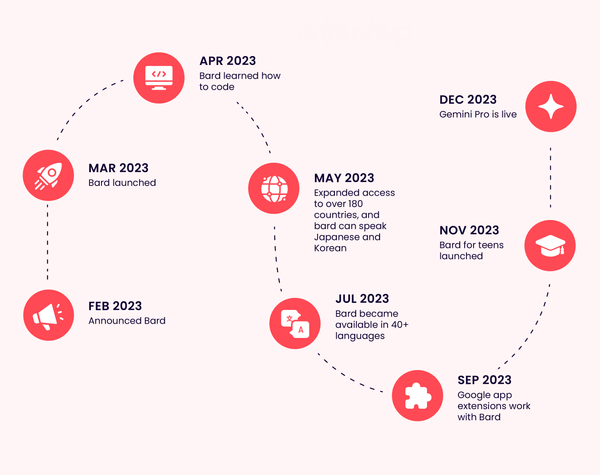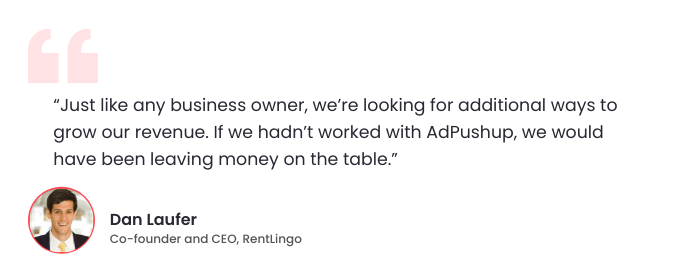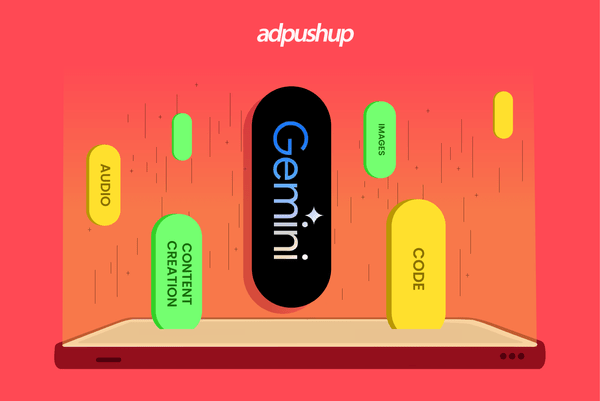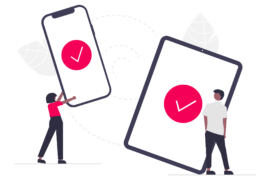Google has done it again and proved that you can’t underestimate them when it comes to Artificial Intelligence. This time around, Google did it with their latest artificial intelligence model called Gemini AI.
Google Gemini AI, launched in December 2023, is a major breakthrough in artificial intelligence, benefiting everyone including website publishers. This advanced large language model (LLM) promises transformative effects on various technological activities.
Notably, it excels in content creation, producing high-quality, informative, and engaging content. This not only boosts publisher efficiency but also optimises resource allocation.
Additionally, Google Gemini AI revolutionizes content personalization by leveraging user data and behaviour. This allows publishers to tailor content individually, enhancing user engagement and satisfaction.
Gemini AI goes further to enhance user experiences by integrating personalized content and creating interactive elements.
What else does Gemini AI has in store? – Let’s find out in the following blog.
Defining Google Gemini AI and its Origins
Google Gemini AI, unveiled in May 2023 during the Google I/O Developer Conference, represents a monumental leap forward in artificial intelligence. Built upon the foundations of its predecessor, PaLM 2, Gemini boasts a unique architecture and capabilities that promise to revolutionize various sectors, including website publishing.
Born from the combined efforts of Google’s Brain Team and DeepMind, Gemini stands as the company’s most capable AI model to date. This impressive feat stems from its evolution from PaLM 2, inheriting its strengths while expanding its horizons.
A Journey from PaLM 2 to Gemini AI: Continuous Evolution
PaLM 2, launched in 2022, established itself as a powerful language model with impressive performance across various tasks. However, its focus on text-based interactions limited its potential.
Gemini AI bridges this gap, embracing a multimodal nature that allows it to seamlessly understand and process information across various formats, including text, code, images, and more. This fundamental shift in capabilities unlocks a vast array of possibilities.
Sundar Pichai’s Insights on Multimodal Advancements
During the unveiling of Gemini AI, Google CEO Sundar Pichai emphasized the significance of its multimodal advancements. He stated, “Gemini is our most capable and general model yet, with state-of-the-art performance across many leading benchmarks. Our first version, Gemini 1.0, is optimized for different sizes: Ultra, Pro and Nano. These are the first models of the Gemini era and the first realization of the vision we had when we formed Google DeepMind earlier this year. This new era of models represents one of the biggest science and engineering efforts we’ve undertaken as a company. I’m genuinely excited for what’s ahead, and for the opportunities Gemini will unlock for people everywhere.”
Google’s commitment is to develop AI that seamlessly integrates with human experiences. By transcending the limitations of text-based models, Gemini AI opens doors to a future where AI assists us in various aspects of our lives, from content creation to code development, more efficiently and naturally.


Embracing Multimodal AI: The Depth of Gemini’s Capabilities
Google Gemini AI’s groundbreaking capabilities lie in its core strength: multimodality. This pivotal feature sets it apart from existing AI models and paves the way for a new era of human-like intelligence. Let’s delve deeper into the meaning of “multimodal” and explore how Gemini AI differentiates itself.
What is Multimodality?
Multimodality refers to the ability of an AI model to understand and process information across various formats. This includes, but is not limited to:
- Text: Natural language processing and comprehension.
- Images: Visual recognition and interpretation.
- Audio: Speech recognition and analysis.
- Code: Understanding and generating programming languages.
Gemini AI: A Uniquely Multimodal Approach
Existing AI models often specialize in specific modalities, such as text-based language models or image recognition tools. This limits their ability to understand and respond to complex situations that require processing information across various formats.
In stark contrast, Gemini AI thrives on the synergy between different modalities. It can seamlessly analyze text and images simultaneously, generating more insightful and contextually relevant outputs. This unique approach empowers Gemini to:
Generate Creative Content
Compose poems, scripts, musical pieces, and more, incorporating textual and visual elements.
Answer Complex Questions
Draw upon information from various sources, including text, images, and code, to provide comprehensive and accurate answers.
Automate Tasks
Analyze data, translate languages, and write code, all while seamlessly switching between different modalities.
Human-Like Multitasking: The Key to True Intelligence
Humans excel at multitasking, effortlessly processing information from various senses and responding accordingly. This ability allows us to navigate the complexities of the real world with adaptability and efficiency.
Gemini’s multimodal architecture mimics this human-like multitasking, enabling it to:
Understand Context
Analyze the overall situation by integrating information from different modalities, leading to more informed decisions and actions.
Adapt To Changing Situations
Quickly switch between modalities based on the context, ensuring effective and efficient responses.
Learn From Multiple Sources
Continuously expand its knowledge base by absorbing information from diverse modalities, fostering a more comprehensive understanding of the world.
The Power of Integration: How Gemini’s Fusion Drives Superior AI
Google Gemini AI stands apart not only for its multimodal capabilities but also for its seamless integration of diverse AI models under one roof. This amalgamation allows Gemini to leverage the strengths of various specialized models, resulting in a synergistic system that surpasses the limitations of individual components.
Embracing the Synergy of Different AI Models
Each integrated AI model within Gemini brings unique strengths to the table:
- Large language models (LLMs): Provide powerful natural language processing capabilities for tasks like text generation, translation, and comprehension.
- Computer vision models: Analyze and interpret visual information, enabling image recognition, object detection, and scene understanding.
- Audio processing models: Extract insights from speech data, facilitating speech recognition, sentiment analysis, and summarization.
- Code generation models: Translate natural language instructions into executable code, automating programming tasks and accelerating development.
By merging these disparate models, Gemini creates a unified system that can analyze and process information across various modalities. This enables it to:
- Generate richer and more comprehensive outputs: By combining information from different modalities, Gemini’s outputs are contextually relevant and informative.
- Perform complex tasks more efficiently: Leveraging the combined capabilities of various models allows Gemini to tackle intricate tasks with greater accuracy and speed.
- Adapt to diverse situations: The ability to seamlessly switch between models enables Gemini to adapt to different scenarios and situations, ensuring optimal performance.
Democratizing AI for Developers: Gemini AI’s Open Access and Potential
Google Gemini AI marks a significant shift in AI software development, not only through its groundbreaking capabilities but also by democratizing access for developers. By opening its doors to developers, Gemini empowers them to leverage its advanced features and build innovative AI applications that can transform various industries.
Developer Access and Usage
Google offers multiple avenues for developers to access and utilize Gemini:
- Google AI Studio: This free, web-based platform allows developers to experiment with various AI models, including Gemini, and build prototypes quickly with minimal coding experience.
- Vertex AI on Google Cloud: Developers can leverage Google Cloud’s Vertex AI platform to access Gemini’s API and integrate it into their existing applications and workflow.
Developer-Friendly Features and API Integrations
To facilitate developer adoption, Gemini boasts several features and integrations:
Intuitive API Design
The API is designed to be easy-to-use and understand, even for developers with limited AI experience.
Comprehensive Documentation
Extensive documentation and tutorials guide developers through the process of integrating Gemini into their applications.
Pre-built Components
Pre-built components for common tasks like text generation, translation, and image recognition allow developers to quickly incorporate Gemini’s capabilities into their projects.
Flexibility and Customization
Developers have the flexibility to customize Gemini’s responses and outputs to suit their specific needs and applications.
Evaluating Gemini AI’s Power: A Comparison and Analysis
When compared to existing large language models like ChatGPT, Gemini exhibits several key advantages that solidify its position as a groundbreaking advancement in AI technology.
Comparative Analysis
| Feature | Gemini | ChatGPT |
| Performance: | Achieves a score of 90.0% on the MMLU benchmark, surpassing human performance in various domains. | Achieves a score of 79.1% on the MMLU benchmark, demonstrating strong performance but not exceeding human capabilities. |
| Multimodal capabilities: | Understands and processes text, code, images, and other formats, enabling generation and analysis across various mediums. | Primarily focuses on text-based interactions, limiting its capabilities to tasks involving natural language. |
| Code generation: | Generates code based on various input formats, including natural language instructions and code snippets. | Limited code generation capabilities, requiring significant user input and expertise. |
| Data analysis: | Analyzes and interprets data across diverse formats, providing valuable insights for decision-making. | Primarily analyzes textual data, limiting its scope of data-driven insights. |
| Accessibility: | Offers various access options, including Google AI Studio, Vertex AI platform. | Currently less accessible to developers, with limited access options and a steeper learning curve. |
Analyzing Computational Prowess
Experts have assumed that Gemini utilizes a massive neural network with 1000 trillion parameters, exceeding the parameter count of other large language models like LaMDA (137B) and Megatron-Turing NLG (530B). This significant computational power translates to:
Increased Capacity for Information Processing
Allowing Gemini to handle complex tasks and generate more detailed and nuanced outputs.
Enhanced Learning Potential
Enabling Gemini to learn from a broader range of data and adapt its responses to specific contexts more effectively.
Greater Accuracy and Reliability
It contributes to more reliable and consistent outputs, minimizing errors and biases.
Unveiling Gemini AI’s Capabilities: Leaked Information and Future Applications
Recent leaks have provided glimpses into the capabilities of Google’s Gemini AI, revealing its potential to revolutionize how developers interact with information and build applications. Analyzing these leaks, we can understand the impact Gemini AI will have on the future of development.
Text and Object Recognition
Leaked screenshots showcase Gemini’s exceptional abilities in text and object recognition. It can accurately identify and interpret text within images, enabling developers to create applications seamlessly integrating visual and textual information. This functionality opens doors for innovative solutions in:
- Augmented reality (AR) applications: Overlaying information and annotations onto real-world objects, enhancing user experience and understanding.
- Image-based search and retrieval: Efficiently search and retrieve images based on specific text descriptions or keywords.
- Accessibility applications: Transcribe text from images and videos into accessible formats, assisting individuals with visual impairments.
Makersuite Integration
The potential of Gemini AI extends beyond its core capabilities. Its integration with Google’s Makersuite platform promises to democratize AI development by providing developers with intuitive tools and resources. This integration enables:
- Simplified AI development: Leverage pre-built components and templates to build AI-powered applications without extensive coding experience.
- Rapid prototyping: Quickly test and iterate on AI-based ideas, accelerating the development process.
- Enhanced collaboration: Facilitate collaboration between developers and AI specialists, fostering innovation and collective problem-solving.
Unleashing Developer Creativity
By combining its powerful capabilities with the user-friendly environment of Makersuite, Gemini AI empowers developers to:
- Build intelligent chatbots: Develop chatbots that understand context and respond to user queries with accurate information and personalized recommendations.
- Automate repetitive tasks: Utilize Gemini’s AI capabilities to automate routine tasks like data analysis and content creation, freeing up valuable time and resources.
- Create custom AI models: Train Gemini AI on specific datasets and tasks to develop tailored AI models for unique applications and needs.
A Glimpse into the Future
The information gleaned from leaks, coupled with Gemini’s integration with Makersuite, paints a compelling picture of the future of development. With its ability to seamlessly handle diverse information formats and its integration with a user-friendly platform, Gemini AI has the potential to:
- Accelerate the development of innovative applications: By making AI accessible and intuitive, Gemini AI can stimulate the creation of solutions across various industries.
- Democratize AI expertise: Lowering the barrier to entry for AI development empowers a broader pool of individuals to contribute to the advancement of the field.
- Shape a more intelligent future: By fostering the development of AI-powered applications across diverse domains, Gemini can contribute to a future where technology enriches and improves our lives in countless ways.
The Impact on Website Publishers: A Revolution in Content Creation and Engagement
The arrival of Google’s Gemini AI signals a significant paradigm shift for website publishers. Its groundbreaking capabilities in text generation, multimodal understanding, and data analysis offer a plethora of opportunities to enhance content creation, user engagement, and personalization.
Empowering Content Creation
Website publishers can leverage Gemini’s ability to generate high-quality content in various formats, such as:
- Automated blog posts: Generate informative and engaging blog posts based on specific topics and keywords, saving time and resources for publishers.
- Product descriptions: Craft compelling and accurate product descriptions that enhance user understanding and purchase decisions.
- Personalized newsletters: Create personalized email newsletters with targeted content based on user preferences and demographics.
- Interactive content: Develop interactive content like quizzes, polls, and surveys to engage users and promote deeper interaction with the website.
Boosting User Engagement
Gemini’s capabilities in understanding user behavior and preferences can be harnessed to:
- Optimize website design and layout: Analyze user interactions and heatmaps to identify areas for improvement and personalize the user experience.
- Tailor content recommendations: Suggest relevant content to individual users based on their reading history and interests, boosting engagement and satisfaction.
- Develop targeted advertising: Generate personalized ads based on user data, increasing advertising effectiveness and user engagement.
- Implement intelligent chatbots: Use AI-powered chatbots to answer user queries, provide customer support, and improve user satisfaction.
Personalization at its Peak
Gemini’s ability to analyze vast amounts of data enables publishers to personalize content and experiences at an unprecedented level:
- Dynamic content generation: Generate content that adapts to individual users’ preferences and interests in real time, creating a truly personalized experience.
- Adaptive learning algorithms: Utilize AI-powered algorithms to learn user behavior and preferences over time, continuously improving content relevance and personalization.
- Multilingual content creation: Translate content into various languages based on user preferences and location, expanding website reach and accessibility.
- Accessibility tools: Generate audio descriptions and transcripts for visual content, making websites more accessible to individuals with disabilities.
Integration in Website Development and Content Management
Gemini’s potential extends beyond content creation and engagement. It can be seamlessly integrated into existing website development and content management workflows:
- Improved data analysis: Gain deeper insights into user behaviour and website performance through advanced data analysis capabilities.
- Enhanced content management: Manage and organize content more efficiently using AI-powered tools for content tagging, classification, and search.
- Content quality assurance: Utilize AI algorithms to detect plagiarism, grammatical errors, and factual inconsistencies, ensuring the highest quality content.
The Future of Website Publishing
Gemini AI is a game-changer for website publishers. Its features empower publishers to boost content creation, user engagement, and personalization. It leads to more website traffic, better user experiences, and success in the digital realm. As Gemini AI continues to advance and integrate with website tools, its influence will transform the publishing industry, creating a more innovative and engaging future for websites.
Conclusion
Google Gemini AI stands poised to revolutionize the way website publishers operate. Its groundbreaking capabilities in content creation, user engagement, and personalization offer a glimpse into a future where websites are more dynamic, intelligent, and responsive to individual needs.
From generating high-quality content in various formats to personalizing user experiences and automating routine tasks, Gemini AI holds the potential to transform every aspect of website publishing.
With its release imminent, website publishers must begin preparing to leverage the power of Gemini AI. By staying in the loop with its capabilities and exploring potential applications, publishers can equip themselves for the future and gain a competitive advantage in the publishing industry.
Frequently Asked Questions
The Gemini API has been released, and Gemini Pro can now be accessed through Google AI Studio, an online tool designed to facilitate the rapid development of prompts.
Currently, developers can avail complimentary access to Gemini Pro and Gemini Pro Vision via Google AI Studio, allowing for up to 60 requests per minute. This level of access proves suitable for a wide range of app development requirements.
In order to utilize Gemini AI, developers must initially establish an account and acquire an API key. Subsequently, armed with the obtained API key, they can make API calls to interact with Gemini AI.







